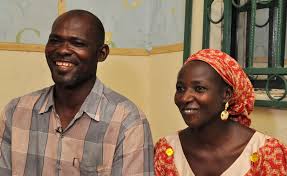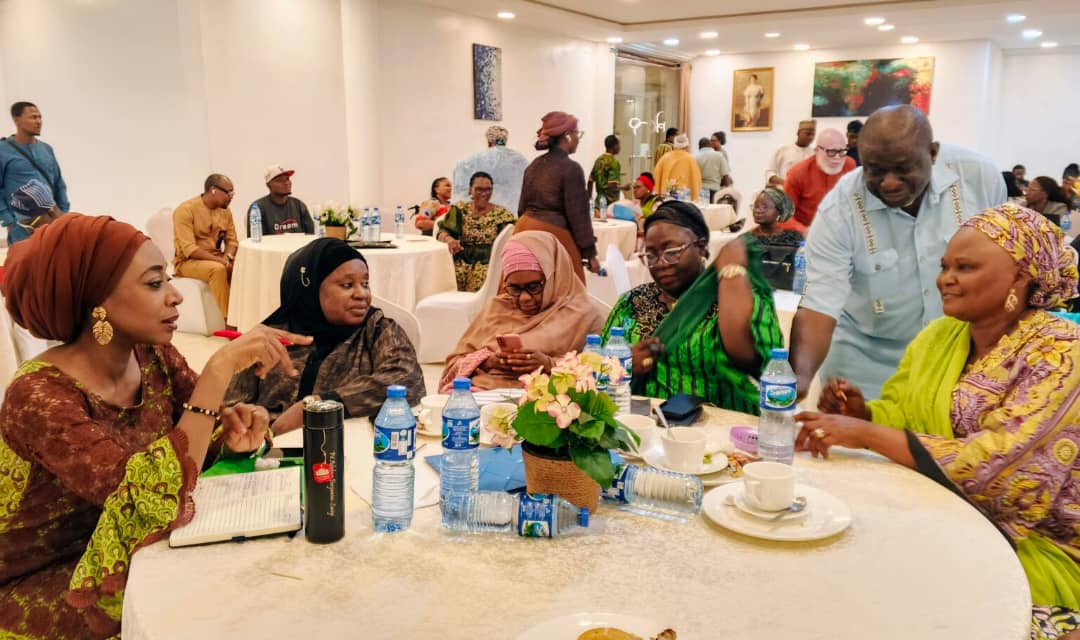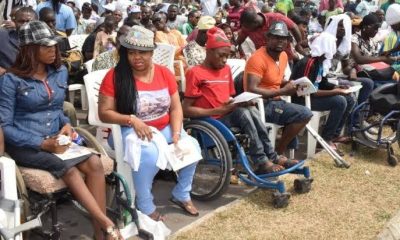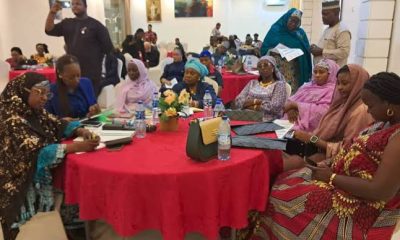News
Parents Decry Failures in Nigerian Education System for Special Needs children

By Admin
Parents of children with special needs have expressed growing frustration over the lack of adequate support and resources for their children in Nigeria’s educational system.
Many families claim that despite government policies aimed at inclusive education, schools across the country are not equipped to cater for the unique challenges faced by students with disabilities.
Speaking to Special needs news in Abuja, the concerned parents shared heartbreaking stories of their children’s struggles within the current system. Mrs. Sarah Auta, a mother of a child with Down syndrome, lamented the lack of specialized training for teachers and inadequate facilities in most schools, making it nearly impossible for her son to receive a proper education.
“My child is eager to learn, but the schools don’t have the necessary tools or staff to support him. He’s often left behind in class because the teachers are not trained to handle children with special needs,” she said. “It’s painful because every child deserves the chance to succeed, but the system is failing them.”
Other parents echoed similar concerns, highlighting the absence of sensory-friendly classrooms, therapists, and assistive technology that could make learning easier for children with disabilities. Many pointed out that while private schools offer some of these services, they are often prohibitively expensive, leaving families without the means to access quality education for their special needs children.
Mr. Adewale Ogundele, whose daughter has cerebral palsy, said he has struggled for years to find a suitable school for her. “The public schools don’t have the resources, and the private ones are too expensive. We’re stuck in a system that doesn’t see our children as important. It’s heartbreaking to watch my daughter’s potential go untapped.”
Advocates have also called for the government to enforce its policies on inclusive education, which, despite being in place, often lack implementation. The National Policy on Education guarantees the right to quality education for children with disabilities, yet many schools across the country fail to meet even basic standards for inclusion.
Dr. Ngozi Anyaegbunam, an education consultant, stressed the need for increased funding and teacher training programs aimed at equipping schools to handle students with special needs. “If Nigeria is serious about inclusive education, there must be deliberate efforts to train teachers, provide resources, and implement infrastructure that supports all students, regardless of their challenges,” she said.
Despite the grim reality, some parents remain hopeful for change, urging the government to listen to their pleas and take action to bridge the gap in the educational system.
They called for increased collaboration between policymakers, schools, and advocacy groups to ensure that no child is left behind.
The Nigerian government, through the Ministry of Education, has pledged to improve the educational framework for children with disabilities, but parents say tangible progress is yet to be seen.
For many families, the road ahead remains uncertain, with hopes that the cries for reform will lead to a future where every child, regardless of ability, has access to a quality education.
News
FCTA, World Bank Partner on Accessible Infrastructure for Persons with Disabilities

By our reporter
The Federal Capital Territory Administration (FCTA), in collaboration with the World Bank, is working to develop accessible infrastructure across the capital, aiming to create an inclusive environment that ensures equal opportunities for Persons with Disabilities (PwDs).
Dr. Mariya Mahmoud, FCT Minister of State , at the close of a three-day workshop on rights-based approaches to disability-inclusive development, governance, and public policy held in Abuja. Dr. Mahmoud was represented by her Special Assistant on Social Investment, Hajiya Maijidda Kuku.
The minister emphasized that the FCT is working diligently toward inclusive governance that leaves no one behind. She noted that this goal would be achieved through the full implementation of the Discrimination Against Persons with Disabilities (Prohibition) Act, 2018.
“This workshop has not only enhanced the technical capacity of participants but also renewed our collective resolve to dismantle barriers and foster inclusive governance,” Mahmoud stated.
She urged participants to apply the knowledge gained in their respective institutions, adding, “Together, we can build an FCT that truly embodies the principles of inclusion, accessibility, and equal opportunity for all.”
Dr. Mahmoud also commended President Bola Tinubu’s administration for its unwavering commitment to equity, inclusion, and dignity—particularly for women and persons with disabilities. She highlighted that the workshop aligns with the Renewed Hope Agenda for a more inclusive Nigeria.
She expressed appreciation to the FCT Women Affairs Secretariat for championing disability inclusion and to the World Bank for its consistent support of social inclusion initiatives within the FCT.
Also speaking at the event, Dr. Adedayo Benjamins-Laniyi, Mandate Secretary of the FCT Women Affairs Secretariat, described the workshop as part of broader efforts to domesticate and implement the United Nations Conventions on disability inclusion, alongside the 2018 Disability Act.
She explained that the workshop, supported by the World Bank, aimed to ensure the meaningful inclusion of persons with disabilities in all aspects of life within the FCT. As a result, the FCTA has developed a framework for coordinated action on disability inclusion, to be led by the Women Affairs Secretariat.
“What began as a disability desk within the Secretariat has now evolved into a comprehensive disability action platform, built through strong collaboration and partnership,” Benjamins-Laniyi said.
She added that the Secretariat would work closely with the existing structures of the FCT Social Development Secretariat to expand disability-inclusive initiatives. The newly developed platform, she explained, would operate as a superstructure reaching from the FCT Administration down to the area councils and rural communities.
“The multi-sectoral framework includes representation from all FCTA secretariats, the six area councils, and community stakeholders—such as the wives of council chairmen, traditional and religious leaders, women and youth groups, civil society organizations, and the media,” she said.
“This model represents a de facto disability convention within the FCT, uniting stakeholders across government, international bodies, communities, and CSOs. It is a vital mechanism for ensuring full implementation of the Disability Act across every part of the FCT,” she added.
Benjamins-Laniyi concluded by emphasizing that the initiative is not merely a slogan but a concrete demonstration of the Renewed Hope Agenda’s political will to create a more inclusive society—one that truly leaves no one behind.
News
Persons with Disabilities Urge Rivers Government to Promote Inclusive Governance

The Joint National Association of Persons with Disabilities (JONAPWD) in Rivers, has urged the state government to prioritise economic empowerment, healthcare and education for Persons With Disabilities(PWDs) in the state.
The group made the remark in an event organised by the association and supported by TAF Africa in collaboration with Disability Right Fund in Port Harcourt on Thursday.
Mr Jake Epelle, Chief Executive Director(CEO)/ Founder, TAF Africa, a Non-Governmental Organisation (NGO), expressed concerns over the exclusion of persons with disabilities from governance and decision-making processes.
Epelle stated that the event, tagged, “Stakeholders Roundtable on the Impact of Political Instability in Rivers State on Persons with Disabilities,” was to highlight the need to give PWDs a sense of belonging.
He called for a concrete and sustainable empowerment projects that would enable persons with disabilities to become resourceful and empower others.
The Chief Executive Director called for grants and scholarships to support persons with disabilities in education, and health as well as ensure their economic empowerment.
In his remarks, Dr Sofiri Peterside of the First Care Diagnostics Hospital, expressed concern over the impact of emergency rules on people with special needs.
He noted that the difficulties faced by able-bodied individuals were worse for those with health concerns or disabilities.
Peterside appealed to President Bola Tinubu-led administration to prioritise social and reliable governance that focused on inclusion of persons with disabilities, and ensure equitable government for all.
Also speaking, Mr Kie Obomanu, the immediate past Chairman of JONAPWD, in Rivers, called for PWDs’ engagement with the administration of the Sole Administrator, Vice Admiral Ibok-Etek Ibas(Rtd) to discuss their concerns and needs.
Obomanu, further, called for policies that would enable the PWDs to access healthcare without financial burdens.
He noted that some policies already existed but emphasised that effective implementation was crucial.
Obomanu also appealed that state government should carry out empowerment schemes that would promote self-reliance and employment opportunities.
Also the state Electoral Chairman of the JONAPWD, Mr Ndubuisi Nwankwo, highlighted the plight of visually impaired students forced to relocate to other states due to inadequate learning facilities.
Nwankwo emphasised the importance of education as an instrument of change and called for the integration of persons with disabilities into the state’s education system.
Similarly, Mr Chigozie Amuda, Human Rights Activist, noted that the United Nations Convention on the Rights of Persons with Disabilities provided for their participation in governance and decision-making processes.
Amuda calls for the inclusion of persons with disabilities in the government structure of Rivers, citing their right to participate in decision-making and contribute to the state’s growth and development.
NAN
News
Disability Advocates Applaud FCT’s Inclusive Policies

By Adeleke Jason
Disability advocates in the Federal Capital Territory (FCT) have applauded the FCT Administration for implementing inclusive policies aimed at integrating Persons with Disabilities (PwDs) into all aspects of public life.
The commendation was given in Abuja on Thursday by members of the disability community at the conclusion of a three-day workshop focused on rights-based approaches to disability-inclusive development, governance, and public policy.
The workshop was part of ongoing efforts to domesticate and implement the Discrimination Against Persons with Disabilities (Prohibition) Act, 2018.
Organised in collaboration with the World Bank, the event aimed to develop a strategic framework for the establishment of the FCT Disability Commission, a key step toward ensuring the full implementation of the Act.
Dr. Adebayo Adebukola, a World Bank Consultant on Disability Inclusion, described the initiative as a “bold step” toward fully integrating Persons with Disabilities (PwDs) into the FCT’s development agenda.
Adebukola has highlighted the significance of the Disability Act in protecting the rights of persons with disabilities (PwDs) and promoting their inclusion in all areas of society. He praised the FCT Women Affairs Secretariat for spearheading efforts toward disability inclusion, commending Dr. Adedayo Benjamins-Laniyi, Mandate Secretary, for taking decisive steps in that direction.
According to him, the Secretariat is developing a disability policy framework that includes capacity-building for officials across relevant Secretariats, Departments, and Agencies (SDAs) within the FCTA, ensuring a multisectoral approach to implementing the Act. He also emphasized the need for inter-agency collaboration to drive the initiative effectively.
Ms. Suzan Onwoma, Vice Chairperson of the Joint National Association of Persons with Disabilities (JONAPwD), FCT Chapter, welcomed the development, calling it a breakthrough for PwDs in the territory. “This signifies access, recognition, and the beginning of a rights-based approach, moving beyond charity,” she said. She lauded the Secretariat’s efforts to institutionalize the rights of PwDs and ensure inclusive governance.
Onwoma also appreciated the outreach to community leaders, traditional institutions, and other stakeholders, describing it as vital for achieving full implementation of the Act.
Clive Otaigbe, a visually impaired member of JONAPwD, expressed optimism, saying the development would amplify the voices of PwDs and lead to increased advocacy for their rights.
Ms. Beatrice Aaala, the pioneer Disability Desk Officer at the Secretariat, reinforced the message that “disability rights are human rights.” She credited Dr. Benjamins-Laniyi for her commitment to inclusion and noted that the disability desk was established to support women and children with disabilities in the FCT.
“With this initiative, no person with a disability will be left out of social interventions or governance,” Aaala said, adding that implementing the Act would challenge discriminatory practices and enhance the full participation of PwDs in society.
-

 News3 months ago
News3 months agoAnambra 2025: Umeoji ahead of Soludo, others in opinion poll
-

 Uncategorized2 months ago
Uncategorized2 months agoWorld Autism Day: How 15-Year-Old Kanyeyachukwu is Painting His Way into History
-
News2 months ago
Oyo State Advances Inclusive Education for Children with Special Needs
-

 Uncategorized2 months ago
Uncategorized2 months agoCommission Calls for Equal Opportunities for PwDs in Renewable Energy
-

 Uncategorized2 months ago
Uncategorized2 months agoLocked out: Nigeria’s 5.1m people with disabilities and banking barriers
-

 News1 week ago
News1 week agoFCTA Adopts Disability Act, Plans Implementation Commission
-

 News6 days ago
News6 days agoPersons with Disabilities Urge Rivers Government to Promote Inclusive Governance
-

 News6 days ago
News6 days agoFCTA, World Bank Partner on Accessible Infrastructure for Persons with Disabilities



